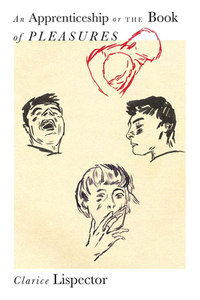Take a photo of a barcode or cover
the writing is amazing. it's actually my first lispector read so i was mesmerized by the prose. however, the story itself does not appear so appealing to me. the yearning was great, but i just can't bring myself to continue. (i'm the problem) still, i like the message it's giving.
despite myself not being able to continue this, i'd still like to discover her other books. hoping something works for me. ♡
despite myself not being able to continue this, i'd still like to discover her other books. hoping something works for me. ♡
challenging
emotional
inspiring
reflective
tense
slow-paced
Plot or Character Driven:
Character
Strong character development:
Yes
Loveable characters:
Complicated
Diverse cast of characters:
N/A
Flaws of characters a main focus:
Yes
emotional
reflective
sad
medium-paced
Plot or Character Driven:
Character
Strong character development:
Yes
Loveable characters:
Complicated
Diverse cast of characters:
No
Flaws of characters a main focus:
Yes
" Nos piores momentos, lembre-se: quem é capaz de sofrer intensamente, também pode ser capaz de intensa alegria."
challenging
hopeful
reflective
Along the lines of Woolf, Melville and Rumi, Lispector is on the search for words to describe the ineffable nature of being alive. Throughout the course of our two main characters, Lorí and Ulisses, the whole of life is splayed out in hopes of finding answers, kind of like doing an autopsy on yourself. The results are less than satisfactory but nonetheless fascinating.
There’s no doubt Lispector is a one of a kind writer.
Her passages about wandering aimlessly through life, waiting for a jolt in the form of something so explosive it can’t possibly be real stops you in your tracks. We both have a strange attachment to the sea and see it as both life-giving and something to be feared. There’s enough passion and yearning here for any romance reader to envelop themselves in tender passages about wondering what the other is up to, when they’ll call, hanging on to every gesture as if a gift from heaven. Yet it all feels in service of…what exactly?
I’m not sure I know Lori or Ulisses more by the end of the book than I knew at the beginning. They remain total enigmas to me. The book sets out some foundations for each individual yet never expands on them. It really isn’t until the last 20 pages, where a consummation happens where it feels like the dams break and we get a flurry of words that left me dizzy, finally feeling what Lispector was trying to do for 130 pages. It was such a stylistic whiplash that I found myself going back to previous pages to see if the prose matched and perhaps I was glazing over the best book I had ever read but alas, I was right.
Lispector says this book was different than all her other ones because she tried to humanize herself, and she ascribed this to the fantastic positive reception this work had. This may become clearer as I read more of her oeuvre,but I do believe the distance she puts between her characters and the events in the story is part of her unique storytelling, creating an inversion of expectations that actually bring us closer to the inner mind of her characters. Here it felt too much like an exercise as a form of personal archeology, the results being all too human.
There’s no doubt Lispector is a one of a kind writer.
Her passages about wandering aimlessly through life, waiting for a jolt in the form of something so explosive it can’t possibly be real stops you in your tracks. We both have a strange attachment to the sea and see it as both life-giving and something to be feared. There’s enough passion and yearning here for any romance reader to envelop themselves in tender passages about wondering what the other is up to, when they’ll call, hanging on to every gesture as if a gift from heaven. Yet it all feels in service of…what exactly?
I’m not sure I know Lori or Ulisses more by the end of the book than I knew at the beginning. They remain total enigmas to me. The book sets out some foundations for each individual yet never expands on them. It really isn’t until the last 20 pages, where a consummation happens where it feels like the dams break and we get a flurry of words that left me dizzy, finally feeling what Lispector was trying to do for 130 pages. It was such a stylistic whiplash that I found myself going back to previous pages to see if the prose matched and perhaps I was glazing over the best book I had ever read but alas, I was right.
Lispector says this book was different than all her other ones because she tried to humanize herself, and she ascribed this to the fantastic positive reception this work had. This may become clearer as I read more of her oeuvre,but I do believe the distance she puts between her characters and the events in the story is part of her unique storytelling, creating an inversion of expectations that actually bring us closer to the inner mind of her characters. Here it felt too much like an exercise as a form of personal archeology, the results being all too human.
This was such an interesting book to me. I have tabs peppering this thing. As I see it, this is a reaction to romance novels, so maybe post-romance (does that exist?). Rather than having the conflict be communication or some other flaw, the conflict is the inciting incident. A man tells a woman that she needs to do some internal growth in order for them to be together, and so the conflict is entirely within her as she earnestly undergoes that spiritual journey.
Both are, to their own eyes anyway, subjectively beautiful and men and women have fallen for them—yet no lasting romantic attraction is something they have encountered. They both have flaws that are stark; the man more so, I think. And is much older. But they are both in an apprenticeship. One which is primarily the process of being fully themselves, loving themselves as they are, while being apart. They can both be insufferable at times, but their endeavour, at least to me, is one of the most interesting things I’ve encountered. It gives beauty and substance to the mundanity of life, and the every day person. Something I generally like a lot in my fiction. Everyone is interesting with the right craft applied.
Reinforcing this is the stream-of-consciousness prose and the unconventional dialogue. It’s almost like what you’d usually get as dialogue, in terms of the refinement of what a character is saying… only it’s translated or run through a filter so it’s the core idea being conveyed. I don’t even know for sure that 100% of the time it’s not just subliminal communication, or something like it. Similar to how thoughts are on the page, with stray wisdom and epiphanies arrived at and then lost like a dream, they often tell one another what is at the heart of their being without, I feel, noticing. So they do say something, as chronicled by our protagonist, but what she recounts is the romanticized, recontextualized information, possibly.
This also felt really conducive to a queer reading. I don’t look for ace representation in things I consume, because generally very few things have it, and it’s pointless to look. But jumping out at me were several passages where it seemed very overt that the protagonist is demiromantic, and/or on the ace spectrum. How she thinks about love and romance versus sex are compartmentalized exactly right, and it kind of helps further understand, if the male counterpart is also ace spectrum, what that magnetic pull is. Like recognizing like, accepting and compartmentalizing certain aspects of their feelings and inner selves. I don’t know. It makes a heck of a lot of sense to me. If anyone else has thoughts on that, I’d love to know.
Both are, to their own eyes anyway, subjectively beautiful and men and women have fallen for them—yet no lasting romantic attraction is something they have encountered. They both have flaws that are stark; the man more so, I think. And is much older. But they are both in an apprenticeship. One which is primarily the process of being fully themselves, loving themselves as they are, while being apart. They can both be insufferable at times, but their endeavour, at least to me, is one of the most interesting things I’ve encountered. It gives beauty and substance to the mundanity of life, and the every day person. Something I generally like a lot in my fiction. Everyone is interesting with the right craft applied.
Reinforcing this is the stream-of-consciousness prose and the unconventional dialogue. It’s almost like what you’d usually get as dialogue, in terms of the refinement of what a character is saying… only it’s translated or run through a filter so it’s the core idea being conveyed. I don’t even know for sure that 100% of the time it’s not just subliminal communication, or something like it. Similar to how thoughts are on the page, with stray wisdom and epiphanies arrived at and then lost like a dream, they often tell one another what is at the heart of their being without, I feel, noticing. So they do say something, as chronicled by our protagonist, but what she recounts is the romanticized, recontextualized information, possibly.
This also felt really conducive to a queer reading. I don’t look for ace representation in things I consume, because generally very few things have it, and it’s pointless to look. But jumping out at me were several passages where it seemed very overt that the protagonist is demiromantic, and/or on the ace spectrum. How she thinks about love and romance versus sex are compartmentalized exactly right, and it kind of helps further understand, if the male counterpart is also ace spectrum, what that magnetic pull is. Like recognizing like, accepting and compartmentalizing certain aspects of their feelings and inner selves. I don’t know. It makes a heck of a lot of sense to me. If anyone else has thoughts on that, I’d love to know.
challenging
reflective
slow-paced
Plot or Character Driven:
Character
Strong character development:
Yes
Loveable characters:
Complicated
Diverse cast of characters:
No
Flaws of characters a main focus:
Yes
emotional
hopeful
inspiring
reflective
fast-paced
Plot or Character Driven:
Character
Strong character development:
Yes
Loveable characters:
Complicated
Diverse cast of characters:
N/A
Flaws of characters a main focus:
Yes








